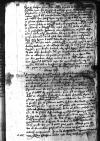Scio Dominationem Vestram naturali affectu libenter miseris et afflictis hominibus subvenire, ob idque confidenter saepius talium causas illi commendare soleo, qui etiam semper a me ad Dominationem Vestram commendaticias petunt. Hac fiducia fretus, ad me praesentium lator providus ⌊Achatius Grabow⌋ venit, quem cum causa sua superiori anno Dominationi Vestrae commendaveram. Quo tempore nihil in ea per serenissimam ⌊maiestatem regiam⌋ pronuntiatum fuit, sed integra ad ⌊iudicium⌋ et ⌊magistratum Gedanensem⌋, ut ibi dictus ⌊Achatius⌋ capita et puncta quaedam interrogationum proponeret , remittebatur.
Hoc cum iam ab eo factum sit et solutiones earum a ⌊iudicio⌋ obtinuerit, a ⌊magistratu⌋ vero non, qui eum in ea re non parum remorarunt , denuo ad aulam proficisci cogitur, ut ibi sententiam diffinitivam (quod futurum sperat) serenissimae ⌊maiestatis regiae⌋ super tota causa audiat.
Quare plurimum me rogavit, ut eum Dominationi Vestrae commendarem, quo illa una cum ⌊reverendissimo domino Cracoviensi⌋ ⌊illi⌋ patrocinaretur et id efficeret, ut tandem ab iis litibus absolveretur; vel, si commode hoc per Dominationem Vestram fieri posset, adversa pars, ⌊abbas⌋ et ⌊conventus Polplinensis⌋, cum eo amice transigerent et causam inter se componerent. In eo, ut suam operam interponat Dominatio Vestra, rogo.
Quam felicissime valere opto.
